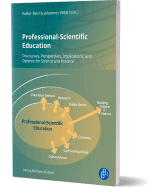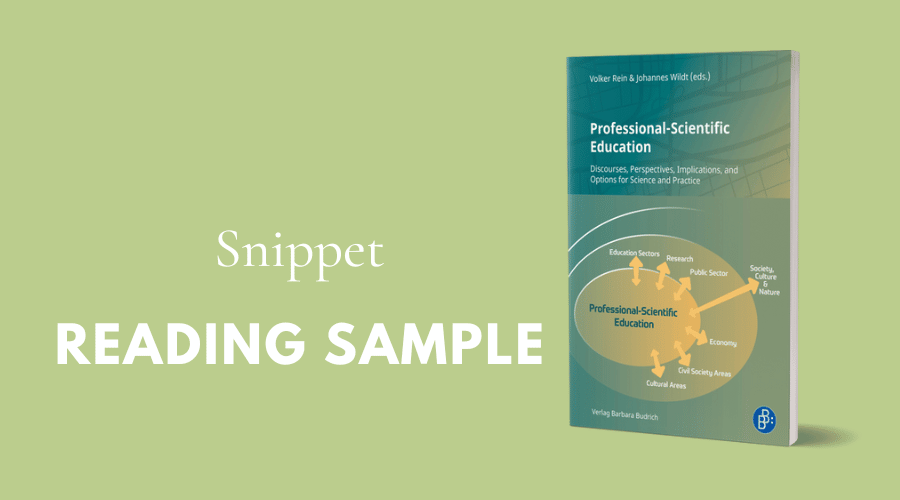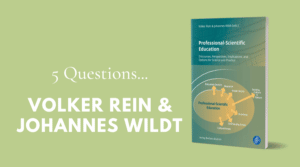Professional-Scientific Education. Discourses, Perspectives, Implications, and Options for Science and Practice
edited by Volker Rein and Johannes Wildt
About the book
There is a growing need for professional-scientific education in science, the labour market and society. However, many key players remain in traditional pillar thinking with regard to professional and scientific education and strong social forces maintain their institutional separation in the education system.
The volume intends to reflect and to enhance the discourse on the relation and integration of professional and scientific education. In a series of contributions by well-known educational scientists from Germany and other countries, the theoretical, conceptual and practical design questions for a qualification are discussed, which sets the connectivity of scientific and professional education within and between courses into an integrative perspective.
Reading sample from the Introduction: pp. 11-15
Introduction
Volker Rein & Johannes Wildt
The objectives and design of education have been moving towards each other for years in many countries at the interface of academic and professional developments (cf. Raffe, 2003). This is related to developments in all sectors of society, framed by the educational policy guiding principle of lifelong learning and promoted by qualifications and educational pathways that can be connected.
In contrast, key social actors persist in an outdated silo thinking of a separation between professional and academic education, which has led to a schism (cf. Baethge, 2007) within the education system. Policymakers are perpetuating this drift between educational pathways, as evidenced by the amendment of legislation on academic and non-academic education in Germany, for example, in recent years (cf. BMBF, 2020 and KMK, 2003). In view of changing societal requirements, however, it is overdue to put this development to the test for further consideration.
Measures to increase permeability between the educational sectors will achieve hardly anything. In essence, they miss the point of a consistent integration that could do justice to the state of knowledge of today’s educational research and the resulting practical reforms. Regardless of different education systems and problematic situations, numerous design approaches have been developed – theoretically and empirically justified worldwide – without, however, setting in motion transformations that transcend academia and educational systems (cf. HRK, 2013; CEDEFOP, 2016–19; Rein & Majumdar, 2018). The anthology seeks ways out of this impasse. It intends to reflect on and further develop the discourse on the relation and integration of professional and scientific education, the related problems and options that go beyond the systemic differentiating or schismatic views traditionally dominant in academia, practice and politics.
First, basic issues in the relationship between scientific and professional education are discussed (Chapter I). Based on a dynamic interaction between the scientification of society and the socialisation of science, central questions of Professional-Scientific Education are raised about the relationship between education, competence and professionalism, as well as between theory and practice. From a diachronic perspective (Chapter II), the development of the relationship between scientific and professional education is traced in its stages, framing embeddings, characteristics and intersections. This gives rise to problems of integrating professional and academic education, which are then discussed at the systemic, qualification-design and teaching levels of action in educational reform:
- at the macro level (Chapter III), the design of links between academic education and profession, which in tertiary education is largely defined by the degree programme system,
- at the meso level (Chapter IV), the curricular design of study programmes or partial study programmes (modules) in higher education with a view to the connectivity of educational programmes in initial and continuing vocational education and training outside the higher education system, and
- at the micro-level (Chapter V), the conceptual foundations of competence development and the design of courses or learning situations that concretise an integrated Professional-Scientific Education.
Finally, the anthology’s findings are presented for discussion in theses on the conditions and possibilities for the development of Professional-Scientific Education, open problems and the need for further research and development are discussed and linked to a transformational scientific perspective.
1) Basic questions on the relationship between scientific and professional education
The discussion of Professional-Scientific Education refers to an inclusive concept of education that encompasses the entire ensemble of institutional settings in which educational processes take place. The terms scientific and professional are used descriptively at this general level to describe the social sectors in which education takes place as scientific or professional learning. The problems hidden behind this descriptive level of observation become obvious when education or educational processes are examined from theoretical and empirical perspectives.
These problems manifested themselves in Europe at the end of the 1990s in the course of the reform of academic education within the framework of the Bologna Process and encompassed all levels of action, from qualifications frameworks to the design of study programmes or curricula to courses. In the midst of the debate on Professional-Scientific Education conducted here, the concept of competence as a guiding category was transferred from vocational education to academic education. As the vocational education function with its focus on employability moved to the centre of the reform of teaching and studies, the discussion on professional qualification in higher education received new impetus with the demand for subject-related and interdisciplinary competences.
The contribution by Brater and Schrode (Chapter I.1) leads into this topic. They focus on considerations on the possible significance of a synthesis of the education traditionally separated into vocational and academic in Germany for competence development within the framework of hybrid education. In doing so, they assume development of work requirements that are increasingly characterised by open, indeterminate and highly complex processes and presuppose scientific education as the basis of vocational competence. They understand these changes as a concrete manifestation of a comprehensive process of social change which, following Beck (1996), can be characterised as ’reflexive modernisation’. From a vocational education and training or sociological perspective, the authors find starting points for a synthesis of scientific and practical learning in competence development and draw conclusions for content-related and structural extensions of vocational competence through scientific education.
In this context, it is crucial for the discussion on the foundations of Professional- Scientific Education with regard to the scope of practice to take as a basis the experiences and actions under the respective constellations of conditions in which they take place. This concerns a broad concept of work that comprehensively includes intellectual activities in their respective contexts (cf. Wildt, 2007). In his “Theory of Practice” (1979), Bourdieu showed that social practices are not fixed constellations. Rather, they can be interpreted as generative structures that are constantly regenerated by the group-specific habitus of the social actors. These structures repeatedly produce the patterns of perception, thoughts and action that characterise the habitus, just like the train that lays its own track as it travels.
The teaching discourse that extends to practice in this sense and at the same time thematises scientific education cannot remain without recourse to scientific theories, methods and subject concepts. It thus inevitably leads to a debate about the question of whether and to what extent the relations between theory and practice result in a consideration of difference, whether and to what extent there are possibilities of overcoming this in the design of learning processes. How can scientific knowledge be included in the solution of professional problems on the one hand and the use of practical professional experience for questions to the sciences for professional-scientific learning on the other? One perspective for this is openend up with Young’s (2008) reflections on sociological concepts of vertical and horizontal knowledge structures. In this context, it must be clarified whether or how the knowledge structures in the different knowledge contexts remain compatible with each other or complement each other, influence each other, or contradict each other and how epistemic interests influence this process.
In his contribution, Guile (Chapter I.2) discusses implications of conceptualising a spectrum of knowledge that encompasses disciplinary, interdisciplinary and transdisciplinary aspects, including its university- and enterprise- based contexts. He proposes relating the academically controversial views on the perspectives of a reflective practice or the reflective practioner (Schön, 1987) and the trinity of professional knowledge (Young & Muller, 2014). He assumes that this would enable a new perspective on the mutual relationship between theory and practice in the process of a continuous decontextualisation and recontextualisation of knowledge and practice. This could relate both perspectives to a professional practice and anticipate future changes in knowledge production.
Guile’s approach, which comes from the sociology of knowledge, is complemented by Allais’ perspective from educational science. In her contribution (Chapter I.3), she discusses the contextualisation of knowledge with the problem of assuming context-unbound learning outcomes in the context of qualifications frameworks. She sees these reference instruments and their focus on learning outcomes as a prime example of fact-free education policy. Educational research, on the other hand, points out that the apparent simplicity of learning outcomes is completely at odds with the complexity of education, including curricula, pedagogy, educational provision and the role of credentials in labour markets. In the author’s view, learning outcomes, when linked to knowledge that gives meaning to educational programmes, cannot cross borders or create transparency for all relevant stakeholders. Learning outcomes should be transparent enough to be traceable to a whole range of potentially different curricula, knowledge choices and learning activities, including work and other life experiences, derived from the internal logic of the subject area and the associated logic of the knowledge field. Further, in her analysis of the correlation of theory and practice, she questions whether and to what extent skills as a bridge between knowledge and action or application can be conceptually considered and operationalised as independent (cf. Allais, 2014), as is the case, for example, in education policy-initiated instruments of qualifications frameworks (cf. UNESCO, 2016).
While the above-mentioned contributions examine the correlations between higher education institutions and professions or society, science and practice primarily in terms of the logics of action found there and their conceptual integration, it cannot be denied that the constellations within educational institutions and professional or social practice are themselves subject to profound change, which also has a momentous effect on their networks of relationships. Due to increasing reductions in basic funding, universities are forced to look for ways to compensate by cooperating with non-academic practice. Since the 1990s, (neoliberal) models such as the entrepreneurial university (Clark, 1998) or public-private partnership (Stifterverband, 1999) have therefore gained traction. In addition to the traditional tasks of research and teaching, the socalled third mission (Henke et al., 2016) emerged, which targeted groups of actors outside the universities. A closer look at the programmes mentioned reveals a bias in favour of an economic or corporate orientation. This may not be surprising under the auspices of a neoliberal science and economic policy, but it is by no means compelling. As a side effect, this mission is simultaneously driving a transformation of the predominantly disciplinary science within universities towards more interdisciplinarity and transdisciplinarity. This becomes visible in a growing movement towards the assumption of social responsibility by university members. To this end, for example, fifty higher education institutions in Germany have joined forces to strengthen civic and community engagement in teaching and learning (Hochschulnetzwerk Bildung in gesellschaftlicher Verantwortung, 2021). With transdisciplinarity, transformative science is thus also growing. It is the basis for the engagement of groups of actors from academia and non-academic practice, including students, to work together on societal transformation problems. (Schneidewind, 2018; Kollmorgen et al., 2015).
***
Would you like to read more?
 Order via our webshop
Order via our webshop
edited by Volker Rein & Johannes Wild

